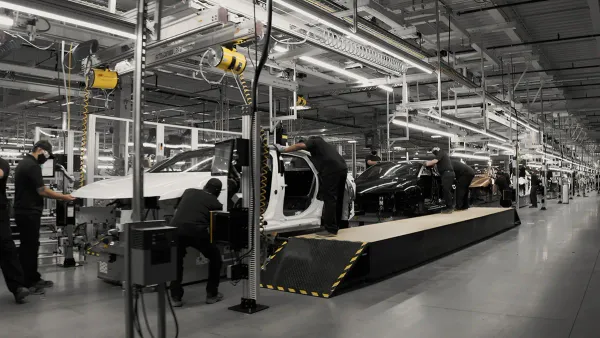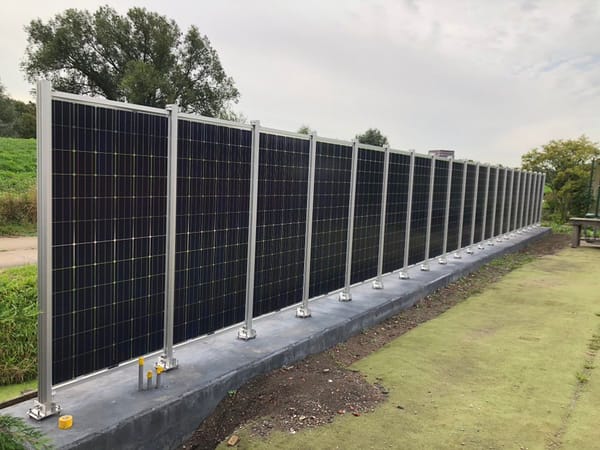Is nuclear power green? If it isn’t, is it better than fossil?
Only two nuclear plants have opened since 2000, and since then 13 others have been shuttered. Of course nuclear power creates radioactive waste that lasts 10,000 years, that’s kind of a problem.
Chart of the Week
1. Is going nuclear also going green?
The Alvin W. Vogtle Electric Generating Plant in Georgia is about to bring online two reactors with 2.2 gigawatts of power. The addition will make the station – with four nuclear reactors, two already operating – the biggest electricity generating station in the United States, capable of powering over 1 million homes. Notably, the nuclear reactors have no carbon emissions, a critical consideration as the U.S. moves to create a carbon-free electrical grid. But the Vogtle reactors are the only two plants opened since 2000, and since then 13 others have been shuttered. Of course nuclear power creates radioactive waste that lasts 10,000 years, that’s kind of a problem.
- France has doubled down on nuclear, while Germany finished shutting its last plants this spring. Europe is split on whether to classify nuclear as “renewable”, making it eligible for tax breaks.
- U.S. DOE is funding nuclear plants to develop hydrogen fuel, which could power planes and steel forges.
Source: Bloomberg
2. Mo’ regulations, mo’ problems…less emissions?
Last Thursday the U.S. EPA released blockbuster new power plant greenhouse gas emissions rules that could take big steps towards achieving levels promised in the 2015 Paris Agreement. But now independent analysis is starting to trickle out, taking a few bites out of the excitement.
- The proposed emissions standards won’t get to President Joe Biden’s campaign pledge of net zero emissions for the electric grid by 2035.
- An analysis shows the rules only impact 147 plants out of a total 3,400 fossil-fuel fired plants in the U.S.
- For plants to stay open, the rules require eliminating greenhouse gas emissions, which for many means using Carbon Capture and Sequestration (CCS), a process that has yet to be proven at scale.
Sources: Grist / Heated / Bloomberg / Climate Home News
3. Surprise! An oil emirate is attempting to derail global climate talks
Every year, nations from around the globe participate in a “Conference of the Parties” (COP) to negotiate aspects of mitigating climate change. The last meeting, COP27, was held in Egypt, and the next meeting, COP28, beginning November 30, will meet in the United Arab Emirates. The COP28 President, Sultan Al Jaber, also leads UAE’s state oil company. As such, reports are emerging that Al Jaber is maneuvering the COP28 proceedings to adopt a goal to reach net zero emissions from extracting oil and gas by 2050 – which basically means oil and gas companies can extract as much as they want, so long as they off-set everything by Carbon Capture and Sequestration (CCS), a process that is largely unproven at scale. Environmentalists call Al Jaber’s proposal “greenwashing”, since it would likely not cover emissions from the use of fossil fuels, only emissions from the extraction process.
- The former UN climate chief, Christiana Figueres, called the UAE proposal “very dangerous” and a “direct threat to the survival of vulnerable nations”.
- At COP27, nearly 200 countries signed off on creating a new fund to compensate countries for some of the damages caused by extreme weather events. COP28 will include discussion on how to capitalize the fund.
- The world must slash CO2 emissions by 45% by 2030 to have a chance of limiting global heating to 1.5C, the level agreed to in the 2015 Paris Agreement.
- COP28 will run from Nov. 30 to Dec. 12
Sources: Financial Times / Climate Home News / Bloomberg / Guardian
4. Heat Rising
It’s getting to be summertime in the Northern Hemisphere, and since this is an El Niño year, we’re getting lots more heat issues – many of which seem to be related to climate change. Already, Spain, Vietnam, India, and the Pacific Northwest have suffered record temperatures. So, each week we’re going to keep a running tab on the overheated parts of the world.
- Temperatures hit 90-degrees Fahrenheit in the Pacific Northwest U.S. and Canada last week. Alberta has 88 active wildfires.
- Drought in Spain is worsening, so the country is spending $2.4 billion on new water supplies, subsidies and direct aid to farmers.
- The Italian Agriculture Minister says the country’s drought is likely permanent, due to climate change.
- India is on alert for above 110-degree Fahrenheit temperatures this week.
- To combat effects of drought, Uruguay is subsidizing bottled water costs
- An explainer on extreme heat, and how wet bulb temperatures are what you should watch to predict heat exhaustion.
Other Things Happened
- Recently the U.S. Department of Energy launched a nifty energy savings website with details on how to get tax credits on all kinds of things.
- Climate change is pushing Vietnamese coffee farmers (who last year exported $4 billion of the beans) to switch from tastier, more weather sensitive Arabica plants, to hardier, less flavorful Robusta plants.
- Vermont enacted a law that incentivizes eliminating oil and wood-based heating, the main way most Vermonters stay warm, in favor of electric heat pumps.
- In 2010, the average American car was 9.7 years old, now it’s 13.6 years, a bad omen for those hoping for a quick national move to EV cars.
Welcome to the bottom of the newsletter! Click here for a cool picture of two galaxies colliding 400 million years ago, before jellyfish and horseshoe crabs were around.





